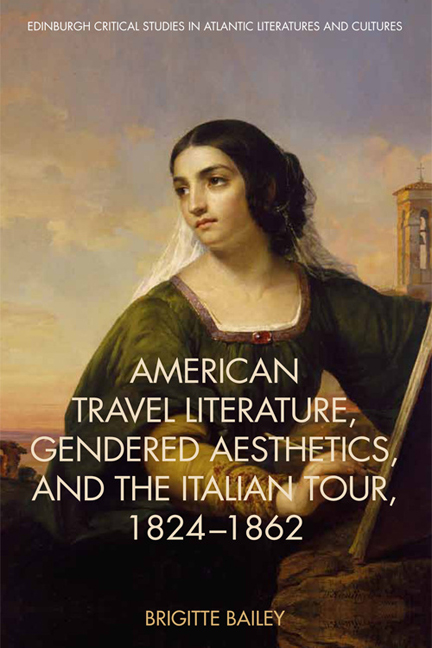Book contents
- Frontmatter
- Contents
- Illustrations
- Acknowledgments
- Introduction
- 1 Irving's Landscapes: Aesthetics, Visual Work, and the Tourist's Estate
- 2 The Protected Witness: Cooper, Cole, and the Male Tourist's Gaze
- 3 Gazing Women, Unstable Prospects: Sedgwick and Kirkland in the 1840s
- 4 Fuller and Revolutionary Rome: Republican and Urban Imaginaries
- 5 National Spaces, Catholic Icons, and Protestant Bodies: Instructing the Republican Subject in Hawthorne and Stowe
- Conclusion: Gender and Genre
- Notes
- Bibliography
- Index
1 - Irving's Landscapes: Aesthetics, Visual Work, and the Tourist's Estate
Published online by Cambridge University Press: 10 May 2023
- Frontmatter
- Contents
- Illustrations
- Acknowledgments
- Introduction
- 1 Irving's Landscapes: Aesthetics, Visual Work, and the Tourist's Estate
- 2 The Protected Witness: Cooper, Cole, and the Male Tourist's Gaze
- 3 Gazing Women, Unstable Prospects: Sedgwick and Kirkland in the 1840s
- 4 Fuller and Revolutionary Rome: Republican and Urban Imaginaries
- 5 National Spaces, Catholic Icons, and Protestant Bodies: Instructing the Republican Subject in Hawthorne and Stowe
- Conclusion: Gender and Genre
- Notes
- Bibliography
- Index
Summary
If … the admirer of nature can turn his amusements to a higher purpose; if it's [sic] great scenes can inspire him with religious awe; … it is certainly the better… . It is so much into the bargain; for we dare not promise him more from picturesque travel, than a rational and agreeable amusement.
William GilpinIn the period when modern tourism developed, from the late eighteenth to the mid nineteenth centuries, a variety of “higher purpose[s]” fueled its language and practice. These purposes included not only the investment of “religious awe” in nature but also the formation of class, gender, and national identities – the focal points of this study. Despite the modest claims of William Gilpin, the eighteenth-century English popularizer of “picturesque travel,” tourists’ perceptions of aesthetic order became the vehicle of their constructions of ideological order. Italy's status within the culture of tourism as the land of the eye, the home of the aesthetic, elicited travelers’ efforts to pictorialize social agendas in terms of foreign landscapes. Washington Irving's repeated engagements with the landscapes of southern Europe over the course of three decades make his work a useful case study of the adaptations of eighteenthcentury British patterns of aesthetic response and their social implications to an emerging American tourist class.
The importance of cultivating an aesthetic gaze – of “practicing” aesthetics – drove U.S. landscape tourism by the 1820s. Kenneth John Myers argues that this decade represents a turning point in the habituation of the process by which “natural environments were … objectified as visually integrated aesthetic wholes,” a process by which both “elites and the emerging middle class” distinguished themselves from lower-class observers. The cultural authority, or even the religious insight (as Gilpin indicates), that aesthetic responses to landscapes implied was secured by naturalizing these responses, as Myers shows: by suppressing the collective memory of learning such “skills” and thereby forgetting “the labor of admiring.” The ostensibly democratic promise of defining “landscape appreciation” as a “natural ability” that transcended class status “obscure[d]” the history of its acquisition and thus naturalized the cultural authority of “northeastern elites”.
- Type
- Chapter
- Information
- Publisher: Edinburgh University PressPrint publication year: 2018



